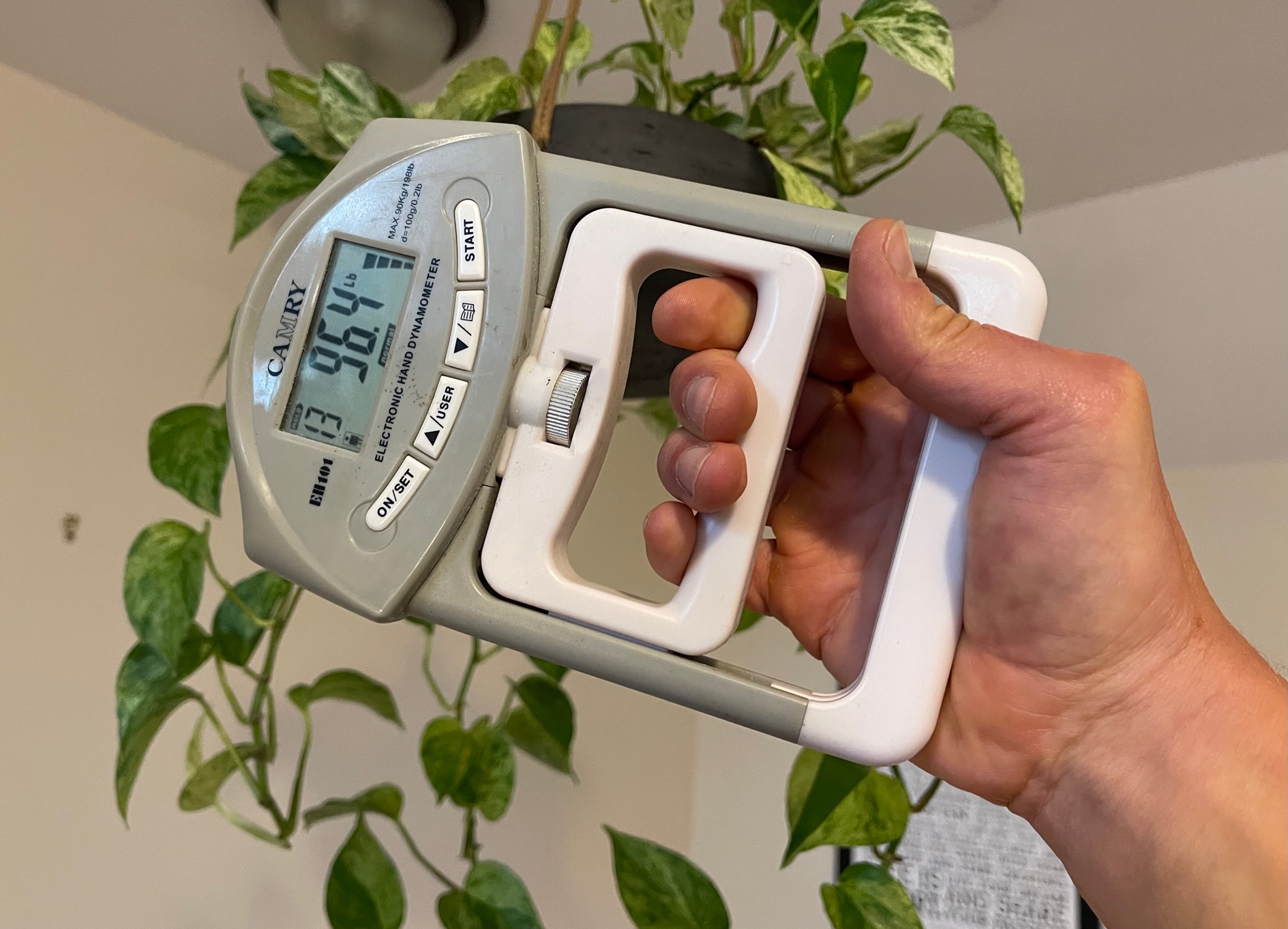“Am I healthy?” you may be wondering. Are my diet and exercise actually helping my body stay resilient?
You might think that you need to visit a doctor, do fancy tests, or do blood labwork to answer this question.
While regular check-ups and tests are important, there’s a simple, quick, and effective way to measure your health at home — grip strength.
Grip Strength – The Missing Metric
The current array of wearable devices — watches, rings, smart scales, etc. — are great tools to help you track your health. Measuring your weight, resting heart rate, and blood pressure can give you valuable feedback on crucial vital signs. I suggest everyone has a good idea of their normal heart rate and blood pressure.
Adding in other measures like step counts and sleep data can give you an even fuller picture of your health. Plus, tracking these data points keep you honest about your daily self-care.
However, these metrics don’t include one variable that may tell you a lot about your overall health: Grip strength.
Grip strength is a valuable indicator of your overall mortality risk that is totally overlooked by the mainstream wellness world. Using a dynamometer to test your grip strength on a daily basis could provide a way to help you answer the question, “Am I healthy? Is all this stuff actually working?”
Measuring your grip strength every day can establish a neuromuscular baseline of health. Like other baseline measures (e.g. resting heart rate) a deviation from this norm might indicate that you haven’t fully recovered from stressful activities. It might also serve as an early warning sign of a disease that hasn’t become symptomatic.
Grip Strength As A Predictor of Health
There’s a growing number of studies that have confirmed the value of grip strength as a prognostic of all-cause mortality. Yes, a predictor of future disability, morbidity, and mortality.
The relation between grip strength and future mortality seems to be pretty robust. It has been shown in old and young people alike, although many of the studies have looked more closely at elderly populations.
Research from the Prospective Urban Rural Epidemiology (PURE) study looked at 139,691 people from 17 countries. During a median follow-up of 4.0 years, They found that grip strength (measured with a Jamar hand dynamometer) was inversely associated with all-cause, cardiovascular and non-cardiovascular mortality, as well as myocardial infarction and stroke.
In fact, the study found that grip strength was a stronger predictor of all-cause and cardiovascular mortality than systolic blood pressure.
Even things like the length of hospital length after surgery, cognitive function, and the severity of Covid have been correlated with grip strength. Some of the findings from these studies are summaries below:
- “In addition to the well-known independent risk factors (i.e. age, obesity, COPD, and CRP level), low grip strength independently increased (about three times) the severity of COVID-19.”
- “Both average pinch grip strength and average power grip strength had a significant negative correlation with duration of inpatient stay.”
- “poorer grip strength was associated with more risk of cognitive decline and dementia. Furthermore, subgroup analysis indicated that people with poorer strength had more risk of Alzheimer’s disease.”
Am I Healthy? Squeeze Something!
Further research is needed to see if the association between grip strength and future mortality is generalizable across countries and socioeconomic circumstances. For instance, the PURE study found the risk of cancer and grip strength were positively associated in high-income countries, but not in middle-income and low-income ones.
Moreover, it’s unclear what might explain the associations between grip strength and all these measures, especially longevity. One possible mechanism is the relationship between grip, muscle mass, and neurological drive. Preserving muscle mass and overall strength, especially in the face of sarcopenia (age-related muscle decline), seems to be a protective factor against falls. Muscle mass also helps blood sugar regulation, acting to preserve metabolic health into old age.
Does that mean you need to train your grip strength specifically?
Most likely a general strength training program that focuses on total body exercises will provide the all benefits you need. After all, to get strong you need to be able to lift and hold heavy things. Maintaining an active lifestyle that involves regular physical exertion will likely give your grip a good workout on its own.
(You can see how your grip strength stacks up to averages here. Table: Mean muscle strength and standard deviation of hand grip according to age, gender and side.)
It’s important to recognize that poor grip strength is not necessarily representative of poor health. Nonetheless, the research seems pretty convincing that low handgrip strength is associated with (if not predictive of) cognitive decline and cardiovascular problems as you age.
Take-Home Summary
- Grip strength may be a cheap, easy, simple, fast reliable indicator of changes in your body that could impact your health.
- Measuring your baseline grip strength may become commonplace as an at-home way of addressing the question, “Am I healthy?”
- Resistance training coupled with proper diet and recovery can help your grip and body stay strong.
- There’s a link between grip strength, longevity, and cognition — the intimate relationship between mind and body.
~ Jeff
Want to learn more about coaching? Here’s how to get in touch.



